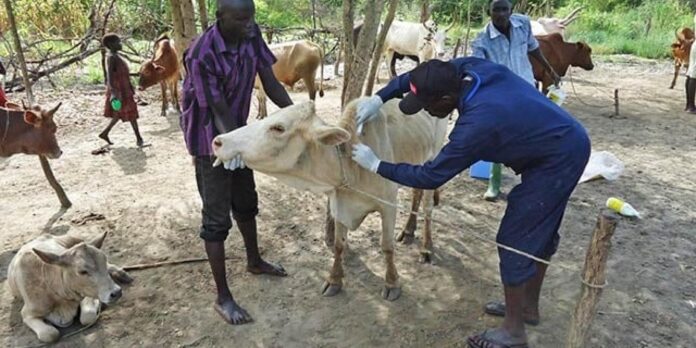The Nigerian Federal Ministry of Livestock Development has raised the alarm over a confirmed outbreak of Anthrax in Zamfara State, sparking fears of a wider spread to neighbouring states. The highly infectious disease, caused by Bacillus anthracis, poses a serious threat to both humans and animals.
The outbreak has prompted an urgent call to action, with authorities intensifying surveillance, issuing health advisories, and urging states bordering Zamfara to prepare for potential cases.
A Deadly Zoonotic Threat
Anthrax is classified as a notifiable disease by the World Organisation for Animal Health (WOAH) due to its potential to cause large-scale outbreaks. The bacterial infection primarily affects warm-blooded animals like cattle, sheep, goats, and horses, but humans who come into contact with infected animals or their products are also at risk.
Symptoms in humans can range from fever, coughing, and nausea to more severe signs such as swollen lymph nodes, haemorrhages, and difficulty breathing. Left untreated, Anthrax can lead to fatal complications.
“The disease can be transmitted from animals to humans,” stated the Ministry in a press release signed by Dr. Adamu Y. Dakogi, representing the Director of Veterinary and Pest Control Services.
Emergency Response Initiated
In response to the outbreak, the Ministry has directed Zamfara State and its neighbours to strengthen their defenses. Authorities have been instructed to activate rapid response teams, create public awareness campaigns, and reinforce disease surveillance efforts.
“States bordering Zamfara must be on full alert and monitor the situation,” the directive emphasized. Dr. Dakogi also highlighted the importance of vaccination, describing it as a crucial preventive measure. “Ring vaccination of susceptible animals in high-risk areas can significantly reduce the spread,” he added.
Neighbouring States on High Alert
States sharing borders with Zamfara, including Sokoto, Katsina, and Kebbi, have been urged to implement emergency protocols. Officials in these regions are working to disseminate information about the disease and encourage livestock owners to report any unusual symptoms in their animals.
Health experts warn that the movement of infected animals could facilitate the spread of the disease across regions. “Unrestricted livestock trade and grazing patterns could complicate containment efforts,” said Dr. Chike Okwuosa, a public health consultant based in Abuja.
Lessons from Past Outbreaks
Nigeria’s history with Anthrax underscores the urgency of swift intervention. In the past, outbreaks in parts of Africa have decimated livestock populations and disrupted local economies dependent on animal husbandry.
“Anthrax outbreaks are a serious threat to food security and public health,” said Dr. Okwuosa. “Timely detection and response are critical to mitigating its impact.”
The country’s current preparedness reflects lessons learned from these experiences. The Ministry is leveraging its resources to identify infected areas quickly, conduct targeted vaccinations, and provide public education on the risks associated with the disease.
Community Awareness and Precautions
The government is calling for increased vigilance among livestock owners, but experts stress the importance of community involvement. Farmers have been urged to report unusual animal deaths immediately, avoid consuming meat from questionable sources, and follow proper hygiene practices when handling livestock.
“Anthrax is preventable when there is coordinated action,” said Dr. Dakogi. “We are counting on the cooperation of all stakeholders to address this threat effectively.”
Global Context and Support
The outbreak in Zamfara comes at a time when several countries are grappling with similar zoonotic diseases. The World Organisation for Animal Health has reiterated the need for international collaboration to combat diseases that threaten both human and animal populations.
Experts say Nigeria’s partnership with global health organizations could bolster its ability to contain the outbreak. “This is not just a national issue; it’s a global concern,” Dr. Okwuosa emphasized.

